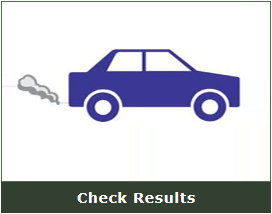(last updated on 12/18/2017)
In addition to other pollutants, vehicles emit smog, air toxics and greenhouse gases all of which cause harm to public health and the environment. Among other health effects, these are especially hard on the respiratory systems of children and older adults. While it's true that vehicles are now being manufactured much cleaner, they are still the top source of air pollution in Oregon and across the nation. Brand new vehicles driven off the assembly line will immediately cause air pollution. Over 30 states, including Oregon, operate Vehicle Inspection Programs (VIP) which help ensure that cars are properly maintained to prevent "excessive" air pollution. Vehicles are originally built to meet air quality standards and then VIP programs conduct periodic inspections to ensure they continue to meet the standards over time.
Just like you have become accustomed to conducting business over the internet for other goods and services, DEQ Too provides motorists (with eligible vehicles ) a convenient online option for vehicle emissions testing.
DEQ understands it can still be a challenge for our operations to match up with everyone's specific needs. That is why we need and want to provide more options. Everyone likes choices. Take the evolution of the banking industry where business was conducted with tellers, then ATM machines became an option, and now we can also bank over the internet. Similarly, today you can receive an emissions test using DEQ's inspectors or self-service machines at our stations. We're now taking it one step further so you'll be able to complete your emissions renewal for your DEQ Too test using the internet. For more information on this method, (instruction sheet).
Besides wanting to provide you with more options, Oregon's population is booming! This new option will help minimize traffic congestion on roadways and at our Clean Air Stations. And less traffic = less air pollution!
Yes.You can continue to test at any of our conveniently located stations where our average wait time is less than 10 minutes. We also provide weekend and evening hours and issue DMV stickers during the same visit. DEQ TOO provides you with a second option. When your vehicle is due for renewal, you can choose between testing in-person at a Clean Air Station or via the internet with DEQ Too.
No. DEQ does not require any registration or enrollment by motorists. You simply test using DEQ Too or test at a Clean Air Station.
Visual inspections are not performed even when you bring your car into a Clean Air Station. Instead, for newer cars, a plug-in cable transmits OBD (on-board diagnostics) data between your car's on-board computer and DEQ's vehicle testing computer. The DEQ Too program allows for the same data transmission, but without a cable connection. The program takes advantage of existing telematics and wireless and/or cellular technology to remotely transmit your car's data to DEQ. This single snapshot of data is sent from wherever your car is located at the time of your choosing.
-
On the home page of the DEQ Too website, click on this icon:
- You'll be asked to review and agree to the terms and conditions.
- You'll be asked to enter your license plate and odometer reading.
-
Then your results will appear. Typically you will see one of two results:

- Then you'll be instructed on how to proceed from there.
When you've paid for your DEQ Electronic Clean Air Certificate, you'll see DMV's logo which will navigate you to their online vehicle registration renewal system.
Your stickers will arrive in your mailbox within as few as 3 business days!
 DMV's online system uses USPS First Class mail which has been in place since 2004, serving almost 300,000 Oregonians annually.
And if you are stopped by law enforcement while waiting for your stickers to arrive, your printout of the online receipt can
be accepted as proof of registration payment for 30 days after you renew.
DMV's online system uses USPS First Class mail which has been in place since 2004, serving almost 300,000 Oregonians annually.
And if you are stopped by law enforcement while waiting for your stickers to arrive, your printout of the online receipt can
be accepted as proof of registration payment for 30 days after you renew.
Private companies, not DEQ, will be distributing their telematics devices in two ways based on your preference. One can be continuously connected to your car. The other can be connected for just a couple of minutes when you need the test and is called a shared device (S-Type) because it can be shared among multiple cars; one car at a time.
DEQ Too uses the Sharing Economy to establish a network of businesses that will let their S-Type device be used by their customers. These businesses would be known as " Participating Locations " and their operators are the " Device Hosts ". Car-sharing and bike-sharing are well known commodities within the fast-growing Sharing Economy. Not everyone needs to "own" an asset, especially if they won't be using it frequently. In the case of DEQ's vehicle inspection program, a test is only needed once every 24 months, so the sharing of emissions testing devices is an ideal asset for the Sharing Economy. These devices will only be used on location, voluntarily by a motorist or by the Host on behalf of the motorist.
View how this could work at a gas station.
DEQ Too uses the Sharing Economy to establish a network of businesses that will let their S-Type device be used by their customers. These businesses would be known as "Participating Locations" and their operators are the " Device Hosts ". Car-sharing and bike-sharing are well known commodities within the fast-growing Sharing Economy. Not everyone needs to "own" an asset, especially if they won't be using it frequently. In the case of DEQ's vehicle inspection program, a test is only needed once every 24 months, so the sharing of emissions testing devices is an ideal asset for the Sharing Economy. These devices will only be used on location, voluntarily by a motorist or by the Host on behalf of the motorist.
Participating Host businesses already exist for a primary purpose other than transmitting OBD data. For example, if a gas station participated as a Host, their primary purpose is for motorists to refuel their vehicle. However, by using the device for a couple of minutes, motorists could take care of their DEQ too while they are refueling. The devices will only be used on location, voluntarily by a motorist or by the Host on behalf of the motorist. Besides gas stations, the other types of Hosts that DEQ envisions include, but are not limited to, auto service/repair shops, oil change shops, auto parts stores and drive-thru car washes.
Once Hosts of Participating Locations enroll, we will add them to the DEQ Too
Business Participant List
and they will subsequently show up on our Participating Locations map. You will be able to find them by clicking on this
icon on the home page of this website:
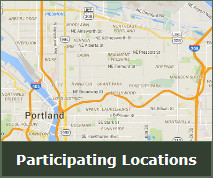
Most of the time, DEQ anticipates the Host will plug in the device and take care of the test on your behalf. It depends on the Host that operates the Participating location. For example, an auto service/repair shop would likely plug in the device for you. But a high-volume, fast-paced location such as a gas station would not likely have time to plug it in for you.
Most of the time, DEQ anticipates the Host will plug in the device and take care of the test on your behalf.
But whenever you'll need to handle everything yourself, you'll want to first become familiar with some information
by clicking on this icon on our website's home page:
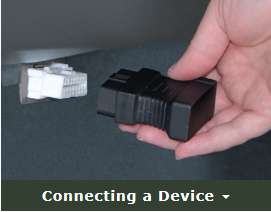
DEQ has informed telematics providers about DEQ Too. C-Type device providers will advertise if and when they fold DEQ Too into their products and service models. Once you have their product, you can authorize them to transmit data to DEQ. If you currently have a C-Type device but your provider is not participating in DEQ Too, you may wish to contact your provider and/or email DEQ about your interest.
Yes, but it will take time. DEQ anticipates that devices will become more and more available for model year 2005 and newer vehicles within our Portland and Medford area testing boundaries. Using the open-market approach , the pace of growth will be driven by telematics device providers as they begin folding DEQ Too into their products and service models.
- You can use the testing device to understand why your Check Engine Light is on , but it will not pass the DEQ test in this condition. It will need repair. Once your vehicle receives repair and the Check Engine light has turned off, be sure your mechanic explains the drive cycles your vehicle must experience prior to going through DEQ's test. Otherwise, if you test too early after a repair, your test results will be "Unready"; meaning your vehicle's computer hasn't finished evaluating all of the emission control equipment.
- Read through the Terms and Conditions and these FAQs carefully.
- The newest four model years are exempt from DEQ testing and it is dependent upon your registration expiration date. Please visit our Newer Model Year webpage Newer Model Year webpage to learn if this exemption applies to your vehicle. If for some reason you end up testing a newer model year vehicle using DEQ Too (or at a Clean Air Station), the DEQ fee will be $0.00.
- With DEQ Too, the only way to renew your vehicle registration is through DMV's Online Registration Renewal System. There are eligibility and restriction requirements for using DMV's system. Also, vehicles new to the State of Oregon cannot conduct their initial registration using the online "renewal" system. So if you meet any of these eligibility restrictions, then you cannot renew online with DMV and the DEQ Too testing option is not for you for this registration cycle.
- Only vehicles with on-board computers that store and send their electronic vehicle identification number (E-VIN) are eligible to use DEQ Too. The E-VIN allows DEQ to confirm which car is being tested and display the corresponding results. Typically, 2005 and newer model years have E-VINs; but some older models have E-VINs and some newer models do not. If your vehicle does not have an E-VIN, then the testing device used at a Participating Location will throw an error message. 2005 and newer model years currently make up about 50% of vehicles on the road. The proportion of qualifying vehicles increases with each new car sold.
There may be a device-usage fee you pay either to a continuously connected (C-Type) telematics device provider or to a participating location. However, since this is an open-market approach, with several parties competing for your business, any price you're charged should be reasonable. And in some cases, there may not be any charge. Participating locations may host devices for free to attract customers over their competitors that did not enroll as Hosts. Or C-Type telematics device providers may not charge extra for adding the DEQ Too feature as they may use it as a means to retain your patronage. In fact, the C-Type telematics device providers enrolled in DEQ Too are currently providing their service for free of charge.
No. Charging the same price for goods and services at a self-service checkout, in-person or over the internet is common business practice. Businesses provide all these various shopping options for customer convenience and low pricing. It's the same for DEQ. DEQ's test fee is among the lowest in the nation and we want to keep it that way. In addition to the convenience we want to offer all motorists, the goal of the DEQ Too program is to help our Clean Air Stations keep up with the increase in population, keep our fees low, and keep from building new stations.
Also, owners of older vehicles do not have this testing option available to them and the option isn't widely available yet. DEQ staff are still be needed in the Clean Air Stations and some work may shift to other activities over time (e.g. internet, phone customer service and auditing of Business Participants to ensure compliance with their Terms and Conditions). If sustained efficiency from DEQ Too makes it possible to lower our testing fee, then the fee would be lowered "across the board" (for all motorists, all testing options: in-person testing, self-service kiosks and the internet/DEQ Too).
In order for a company to provide services in the DEQ Too program, the company must meet certain terms and conditions and then get placed on the official DEQ Too Business Participants List. The types of business participants are:
- An Auto Dealership that needs to test its multiple vehicles
- A company needs to test its multiple, Fleet of vehicles
- A Device-Use Business/Host
- A Telematics Device Manufacturer
From the DEQ Too home page, the below icon will take you to the webpage for businesses interested in joining the program.
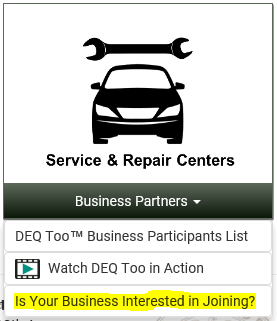 Then click on your business type, read and agree to the Terms and Conditions and then submit your enrollment documentation.
DEQ will make a determination within 30 days of receiving your documentation. Or, if at this time you only wish to express
interest to DEQ in becoming a
business participant
or have specific questions, then please send us an email with your
name, business name and phone number.
Then click on your business type, read and agree to the Terms and Conditions and then submit your enrollment documentation.
DEQ will make a determination within 30 days of receiving your documentation. Or, if at this time you only wish to express
interest to DEQ in becoming a
business participant
or have specific questions, then please send us an email with your
name, business name and phone number.
No. DEQ is intentionally not contracting this out to any single business. Instead, the DEQ Too program uses an open market, free-enterprise approach which allows multiple Businesses Participants to join as long as they meet our specifications for their business type.
Absolutely. Engine Care = Clean Air! Your vehicle doesn't need to be due for DMV/DEQ. Your DEQ Too results will provide you with the code(s) and a brief description of what is causing your Check Engine light to illuminate. It could be as simple as a faulty gas cap to something more complex. You can then decide if you need to seek help from a repair facility for full diagnostics and evaluation. Note: When the Check Engine light is on, then (in the vast majority of cases) it will not pass DEQ.
The shared vehicle telematics device is one that can be shared for use by multiple vehicles; one vehicle at a time. By comparison, the other telematics device (C-type) is continuously connected to and used by only one vehicle.
The only objective of the S-type device is to transmit a snapshot of each vehicle's OBD data to DEQ. The general public would use S-type devices by using them at participating locations which exist for a primary purpose other than transmitting OBD data. For example, if a gas station participated as a Host, their primary purpose is for motorists to refuel their vehicle. However, by using the device for a couple of minutes, motorists could take care of their DEQ too while they are refueling. Besides gas stations, the other types of Hosts DEQ envisions include, but are not limited to, auto service/repair shops, oil change shops, auto parts stores and drive-thru car washes.
This device is one that is associated with and continuously connected to one vehicle. C-type devices are either built-in to the vehicle's system during auto manufacturing or plugged-in after-market. By comparison, the other telematics device (S-type) can be shared for use by multiple vehicles.
C-type devices have been around for years and have several primary objectives other than transmitting OBD data to DEQ. Example objectives include auto fleets optimizing driving routes and maintenance schedules, hands-free calling, turn-by-turn navigation, roadside assistance, stolen vehicle assistance, usage-based auto insurance programs to help motorists achieve lower premiums, etc. Regardless of their primary objectives, these C-Type devices can also capture OBD data and be used for DEQ too.
The term comes from the science of Telecommunications and Informatics applied in wireless technologies and computational systems. Telematics refers to the use of wireless devices to transmit data typically in the context of automobiles, either built-in during manufacturing, or connected after-market via the OBD (on-board diagnostics) port.
No. The data that comes to DEQ will be no different than the data we receive during a test at a Clean Air Station.
Actually, visual inspections are not performed even when you bring your car into a Clean Air Station. While our software cannot catch everything, it is capable of determining if some defeat devices are being used such as when vehicles use certain fraudulent OBD "simulators". In fact, with every new model year of vehicles, computerized vehicle testing is becoming harder and harder to tamper with.
Using our testing software in a Clean Air Station or DEQ Too, if it becomes evident that a business has been tampering with or altering OBD systems or data, an investigation will be launched. It is a criminal violation of the Federal Clean Air Act to alter or tamper with OBD systems or data. And, of course, if any DEQ Too Business Participant is found to be in violation, they, along with any of their testing equipment will no longer be allowed to participate in DEQ Too.
To learn why DEQ does not visually inspect computerized vehicles, even at a Clean Air Station, view the agency's primary website.
Our Clean Air Station inspectors are trained not to conduct a test if they see excessive smoke coming from the tailpipe of a vehicle. If a smoking vehicle somehow receives a test, our software can generally identify if an emissions component is not working and that component could be the cause of the excessive smoke. Such a vehicle would fail the computerized test in a Clean Air Station. So the same vehicle failing a Clean Air Station computerized test, would also fail the DEQ Too computerized test.
Also, when complaints come into DEQ from the public about vehicles with excessive smoke, we send a letter to the vehicle owner informing them that their vehicle is in violation. That practice will continue and in addition, the Department will be tying the complaint data to our testing databases to ensure those smoking vehicles cannot be tested through the DEQ Too testing option.
And finally, DEQ's Terms and Conditions:
- Require Auto Dealerships, Fleets and Hosts to not allow testing of vehicles with any visible smoke coming from the tailpipe.
- Authorize DEQ to make announced and unannounced visits to ensure they are complying with this.
No. States across the nation use the Clean Air Station type of test to interface with the vehicle's on-board diagnostics (OBD) computer to periodically check if the emission control components are still working. These OBD tests are typically done every 2 years and take just minutes to complete. Volkswagen skirted the federal test that approves vehicles to be sold on the market when they are first manufactured. That approval process is done in a laboratory setting and takes over a week to conduct. So the one-time federal test initially certifies that vehicles are built clean and then the periodic Clean Air Station OBD tests ensure the vehicles remain clean.
The test to ensure a vehicle was actually built clean (no excessive air pollution) was compromised by Volkswagen. The Environmental Protection Agency has since made changes to the federal test so it cannot be compromised like that again. The OBD test in Clean Air Stations across the country continues to be the most cost-effective means to periodically check on vehicles' emission control components. The DEQ Too OBD test is identical to the Clean Air Station OBD test.
While it's true that there has been some remote hacking of vehicle onboard computers by academic and security professionals with special equipment and vehicle manufacturer information, there has never been a reported hacking by anyone other than these security experts. The automotive and telematics industries have responded by enhancing the security measures already in place and by adding new measures.
A key theme of DEQ Too is to take advantage of proven, safe and secure technology that already exists in the marketplace. Telematics providers have been safely accessing vehicle OBD systems and securely transmitting vehicle data for years now. They have been sending and describing this data to their customers via email or other electronic means. With DEQ Too, the motorist is simply authorizing their telematics provider to share the OBD data with DEQ.
DEQ specifically limits the OBD information exchange between the telematics device and the vehicle to only the basic test data required for a valid OBD test. Access to other computers and systems onboard the vehicle is strictly prohibited by DEQ. Wireless systems are required to meet industry Data Encryption Standards (DES) to mitigate the risk of a communication compromise.
Some motorists already have cars equipped with built-in systems or after-market telematics devices that provide features such as turn-by-turn navigation, roadside and stolen vehicle assistance, usage-based auto insurance, etc. If arranged by the telematics provider and authorized by the motorist, then these devices and systems are capable of transmitting on-board diagnostics (OBD) data to DEQ. While originally intended for other uses, they can also be used for DEQ too.
Also, participating businesses will lend you a telematics device to plug into your car for a couple of minutes while on location and then you return it. While you are taking care of your other car needs at such places, you can take care of your DEQ too.
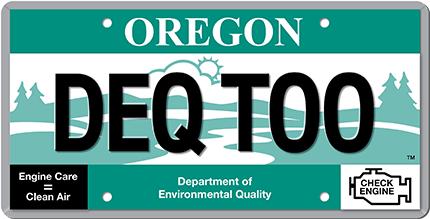 The DEQ Too logo looks like a license plate because motorists are trying to renew their DMV registration stickers
so they don't expire. But before they can renew their stickers, they must ensure their car is well maintained for
the purpose of clean air. Engine Care = Clean Air!
The DEQ Too logo looks like a license plate because motorists are trying to renew their DMV registration stickers
so they don't expire. But before they can renew their stickers, they must ensure their car is well maintained for
the purpose of clean air. Engine Care = Clean Air!
The logo has been trademarked and can only be used by companies that have met DEQ's Terms and Conditions and then placed onto the official DEQ Too Business Participant List. Wherever you see this logo, you can be assured that the business is legitimately associated with the DEQ Too program.
